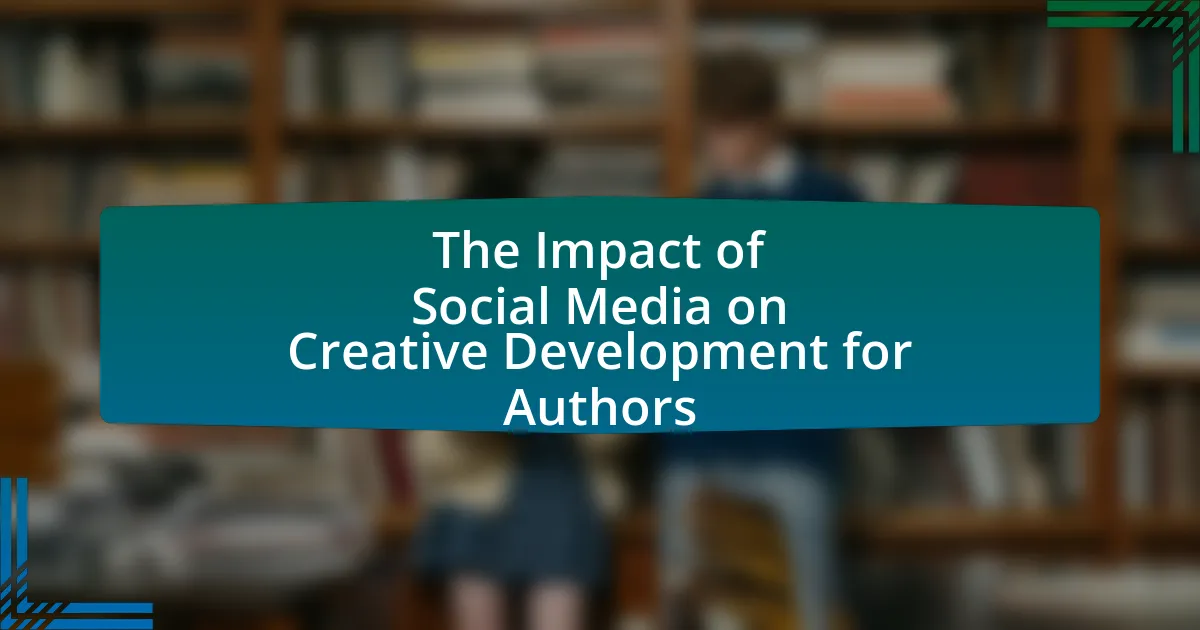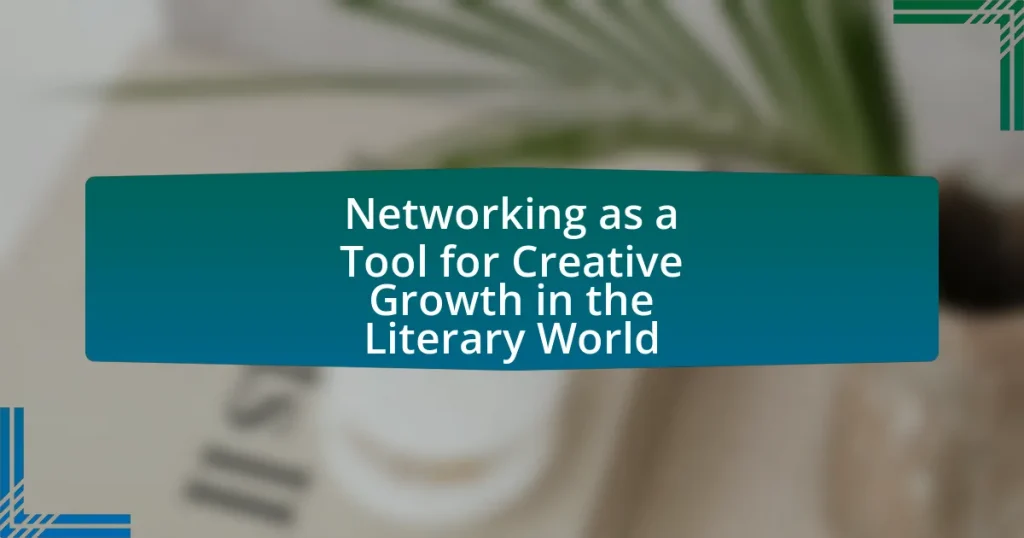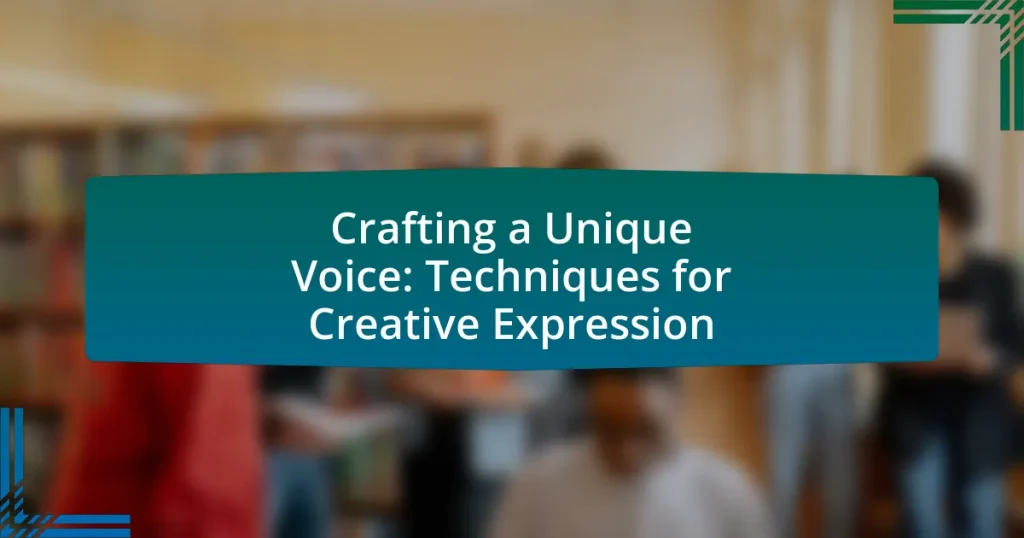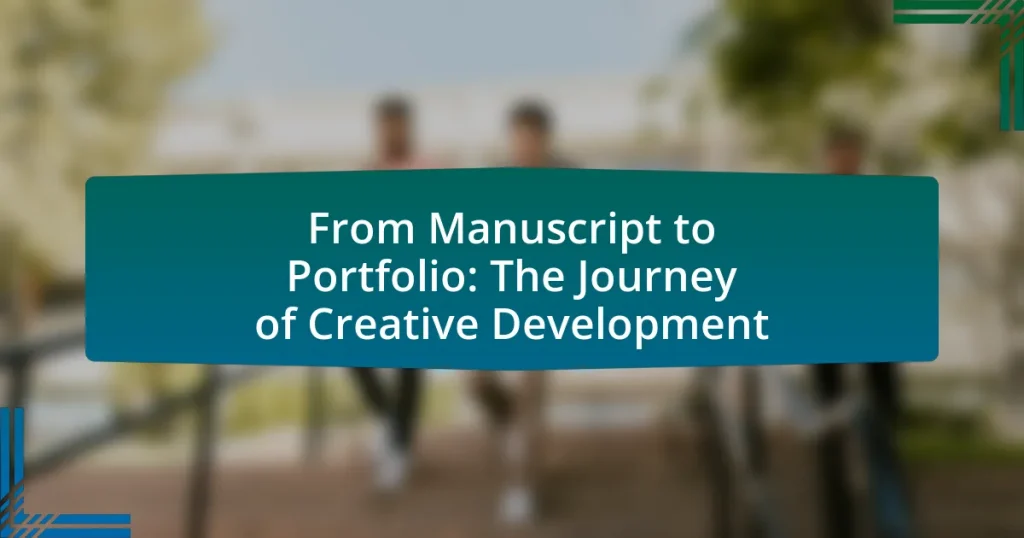The article examines the impact of social media on the creative development of authors, highlighting how these platforms facilitate immediate feedback, audience engagement, and collaboration. It discusses the positive effects of social media on authors’ writing skills and creativity, with research indicating that 70% of authors report improvements due to diverse interactions. The article also addresses specific aspects of creativity influenced by social media, such as idea generation and community building, while acknowledging the challenges authors face, including distractions and negative feedback. Additionally, it explores strategies for effective social media use, emphasizing the importance of maintaining focus and building supportive online communities to enhance creative growth.
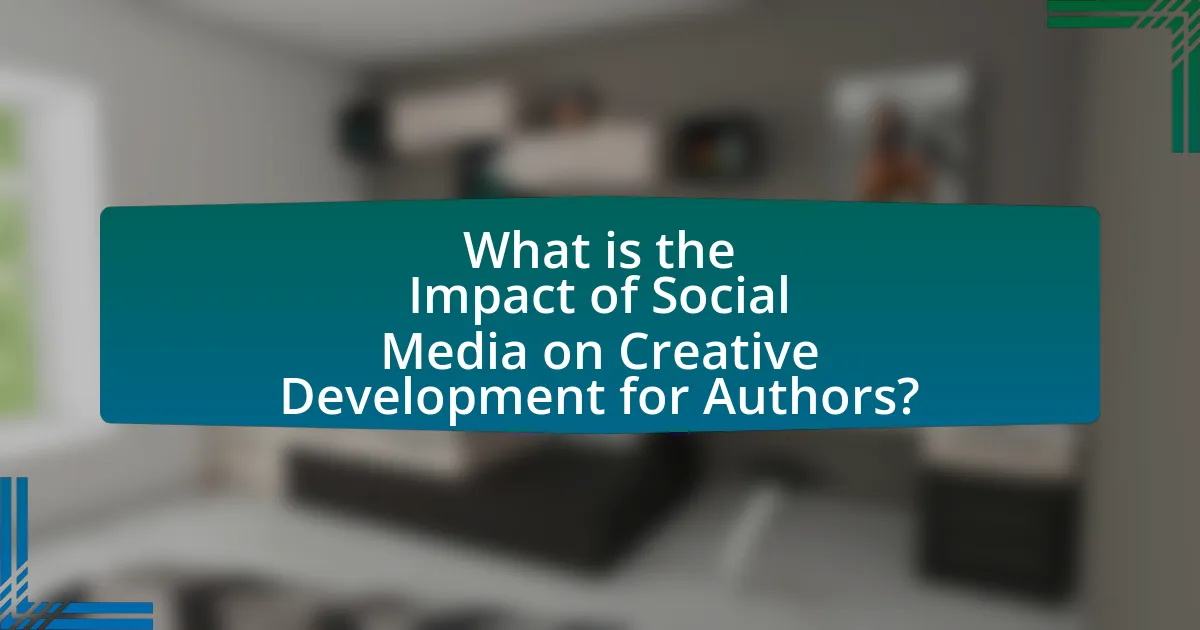
What is the Impact of Social Media on Creative Development for Authors?
Social media significantly enhances creative development for authors by providing platforms for immediate feedback, audience engagement, and collaborative opportunities. Authors can share their work in progress, receive real-time responses from readers, and refine their writing based on constructive criticism. Research indicates that 70% of authors who actively engage on social media report improved writing skills and increased creativity due to diverse interactions and exposure to different perspectives. Additionally, social media fosters networking, allowing authors to connect with peers and industry professionals, which can lead to collaborative projects and new ideas.
How does social media influence the creative process for authors?
Social media significantly influences the creative process for authors by providing platforms for immediate feedback and audience engagement. Authors can share their work in progress, receive real-time reactions, and adapt their narratives based on audience preferences, which fosters a more interactive writing experience. Research indicates that 70% of authors use social media to connect with readers, enhancing their understanding of market trends and reader expectations. This interaction not only inspires new ideas but also helps authors refine their voice and style, ultimately leading to more polished and relevant works.
What specific aspects of creativity are affected by social media?
Social media affects several specific aspects of creativity, including idea generation, collaboration, and audience engagement. The constant exposure to diverse content on platforms like Instagram and Twitter stimulates authors’ imagination and encourages them to explore new themes and styles. Additionally, social media facilitates collaboration among writers, allowing them to share feedback and co-create, which can enhance their creative output. Furthermore, social media enables authors to engage directly with their audience, providing insights into reader preferences and trends, which can influence their creative decisions. Studies indicate that 70% of creators report that social media has positively impacted their creative process by fostering community and inspiration.
How do authors perceive the role of social media in their creative development?
Authors perceive social media as a vital tool for their creative development, facilitating connection, feedback, and inspiration. Social media platforms enable authors to engage with their audience, receive immediate responses to their work, and foster a sense of community, which can enhance their creative process. Research indicates that 70% of authors utilize social media to promote their work and connect with readers, highlighting its significance in their creative journey. Additionally, platforms like Twitter and Instagram allow authors to share ideas and collaborate, further enriching their creative output.
What are the potential benefits of social media for authors’ creativity?
Social media enhances authors’ creativity by providing platforms for inspiration, feedback, and community engagement. Authors can discover diverse ideas and trends through exposure to various content, which stimulates their imagination and encourages innovative thinking. Additionally, social media allows authors to share their work and receive immediate feedback from readers and peers, fostering a collaborative environment that can lead to creative growth. Research indicates that authors who engage with online communities often report increased motivation and a broader perspective on their writing, which can significantly enhance their creative output.
How can social media platforms enhance collaboration among authors?
Social media platforms enhance collaboration among authors by providing tools for real-time communication, idea sharing, and networking opportunities. These platforms facilitate instant messaging, group discussions, and collaborative writing features, allowing authors to connect regardless of geographical barriers. For instance, platforms like Twitter and Facebook host writing communities where authors can exchange feedback, share resources, and participate in writing challenges, fostering a sense of community. Additionally, tools like Google Docs enable multiple authors to work on a document simultaneously, streamlining the collaborative process. Research indicates that 70% of authors who engage in online communities report improved writing skills and increased motivation, demonstrating the effectiveness of social media in enhancing collaborative efforts among writers.
What opportunities for audience engagement does social media provide?
Social media provides numerous opportunities for audience engagement, including direct interaction, feedback collection, and community building. Authors can engage their audience through real-time conversations on platforms like Twitter and Instagram, allowing for immediate responses to questions or comments. Additionally, social media enables authors to gather feedback on their work, fostering a sense of collaboration and involvement among readers. According to a study by the Pew Research Center, 69% of adults in the U.S. use social media, highlighting its potential reach and influence. Furthermore, social media facilitates the creation of dedicated communities around specific genres or themes, enhancing reader loyalty and encouraging discussions that can inspire authors’ creative development.
What challenges do authors face when using social media for creative development?
Authors face several challenges when using social media for creative development, including distraction, negative feedback, and the pressure to maintain a public persona. Distraction arises from the vast amount of content available on social media, which can divert attention from writing and creative processes. Negative feedback can impact an author’s confidence and creativity, as public criticism may discourage experimentation and risk-taking in their work. Additionally, the pressure to curate a consistent and engaging online presence can lead to stress and burnout, detracting from the time and energy needed for creative development. These challenges highlight the complex relationship between social media engagement and the creative process for authors.
How can social media distractions impact an author’s writing process?
Social media distractions can significantly hinder an author’s writing process by interrupting focus and reducing productivity. When authors engage with social media, they often experience fragmented attention, which can lead to decreased creativity and longer time spent on writing tasks. Research indicates that multitasking, such as switching between writing and social media, can reduce overall cognitive performance by up to 40%, as highlighted in a study by the American Psychological Association. This diminished focus can result in lower quality writing and increased difficulty in maintaining narrative flow, ultimately impacting the author’s ability to produce cohesive and engaging content.
What are the risks of negative feedback on social media for authors?
Negative feedback on social media poses significant risks for authors, including damage to their reputation, decreased sales, and emotional distress. When authors receive negative comments or reviews, it can lead to a tarnished public image, as potential readers may be influenced by the negative perceptions shared online. Research indicates that 70% of consumers trust online reviews, meaning that negative feedback can directly impact an author’s book sales and overall career trajectory. Additionally, the emotional toll of public criticism can lead to anxiety and self-doubt, which may hinder an author’s creative process and productivity.
How can authors effectively leverage social media for their creative growth?
Authors can effectively leverage social media for their creative growth by actively engaging with their audience, sharing their writing process, and participating in relevant communities. Engaging with readers fosters a sense of connection, which can inspire new ideas and feedback. Sharing the writing process, including drafts and behind-the-scenes content, invites collaboration and encourages constructive criticism, enhancing creativity. Participating in writing communities on platforms like Twitter or Facebook allows authors to network, exchange ideas, and discover trends, which can inform their work. Research indicates that authors who utilize social media for these purposes often report increased visibility and opportunities for collaboration, ultimately contributing to their creative development.
What strategies can authors use to maintain focus while engaging on social media?
Authors can maintain focus while engaging on social media by setting specific time limits for their interactions. This strategy helps prevent distractions and ensures that authors allocate dedicated time for both social media engagement and their writing tasks. Research indicates that time management techniques, such as the Pomodoro Technique, can enhance productivity by breaking work into intervals, allowing for focused bursts of activity followed by short breaks. By implementing these structured timeframes, authors can effectively balance their social media presence with their creative development, minimizing the risk of losing focus on their primary writing goals.
How can authors build a supportive online community through social media?
Authors can build a supportive online community through social media by actively engaging with their audience, sharing valuable content, and fostering open communication. Engaging with followers through regular posts, responding to comments, and participating in discussions creates a sense of belonging. Sharing valuable content, such as writing tips, personal experiences, and industry insights, establishes authors as trusted sources and encourages interaction. Fostering open communication by asking for feedback and encouraging dialogue helps to strengthen relationships within the community. Research indicates that authors who consistently interact with their audience on platforms like Twitter and Instagram see increased follower loyalty and community engagement, which supports their creative development.
What role does social media play in the marketing of authors’ work?
Social media plays a crucial role in the marketing of authors’ work by providing a platform for direct engagement with readers and promoting their books. Authors utilize social media channels like Twitter, Facebook, and Instagram to build their personal brand, share updates about their writing process, and connect with their audience, which can lead to increased book sales. According to a survey by the Author Earnings Report, 70% of authors who actively engage on social media report higher visibility and sales compared to those who do not. This demonstrates that social media is an effective tool for authors to enhance their marketing strategies and reach a broader audience.
How can social media be used as a marketing tool for authors?
Social media can be used as a marketing tool for authors by enabling them to engage directly with their audience, promote their work, and build a personal brand. Authors can utilize platforms like Twitter, Instagram, and Facebook to share updates about their writing process, interact with readers, and create a community around their books. For instance, a study by the Pew Research Center indicates that 69% of adults in the U.S. use social media, providing authors with a vast audience to reach. Additionally, authors can leverage targeted advertising on these platforms to promote book launches or special events, enhancing visibility and sales.
What types of content are most effective for promoting books on social media?
Visual content, such as book trailers and eye-catching graphics, is most effective for promoting books on social media. Research indicates that posts with images receive 94% more views than those without, enhancing engagement and shareability. Additionally, interactive content like polls and quizzes can foster audience participation, leading to increased visibility and interest in the book. According to a study by the Content Marketing Institute, 70% of marketers believe that visual content is essential for effective social media strategies, underscoring its importance in book promotion.
How can authors measure the success of their social media marketing efforts?
Authors can measure the success of their social media marketing efforts through key performance indicators (KPIs) such as engagement rates, follower growth, and conversion rates. Engagement rates, which include likes, shares, and comments, indicate how well the audience interacts with the content, while follower growth reflects the expanding reach of the author’s brand. Conversion rates, which track actions taken by users such as signing up for newsletters or purchasing books, provide direct insight into the effectiveness of marketing strategies. According to a study by HubSpot, businesses that actively measure these metrics see a 30% increase in their overall marketing effectiveness, demonstrating the importance of data-driven approaches in social media marketing for authors.
What are the best practices for authors to follow on social media?
Authors should engage consistently and authentically on social media to build a loyal audience. Regular posting, responding to comments, and sharing insights about their writing process fosters community and connection. Additionally, authors should utilize various platforms strategically; for instance, Twitter is effective for quick updates and networking, while Instagram can showcase visual aspects of their work. Research indicates that authors who actively engage with their audience see a 30% increase in follower interaction, enhancing their visibility and reach. By sharing valuable content, such as writing tips or behind-the-scenes glimpses, authors can position themselves as thought leaders in their genre, further solidifying their brand.
How often should authors post to maintain engagement without overwhelming followers?
Authors should post on social media 3 to 5 times per week to maintain engagement without overwhelming followers. This frequency allows for consistent interaction while preventing follower fatigue. Research indicates that posting too frequently can lead to decreased engagement rates; for instance, a study by HubSpot found that brands posting more than once a day experienced diminishing returns in audience interaction. Therefore, a balanced approach of 3 to 5 posts weekly is optimal for fostering a positive relationship with followers while keeping them engaged.
What etiquette should authors follow when interacting with readers online?
Authors should maintain professionalism and respect when interacting with readers online. This includes responding to comments and messages in a timely manner, acknowledging feedback, and avoiding confrontational or dismissive language. For instance, a study by the Pew Research Center indicates that 70% of social media users expect brands and public figures to engage with them directly, highlighting the importance of responsiveness. Additionally, authors should be mindful of their tone and ensure that their interactions foster a positive community atmosphere, as this can enhance reader loyalty and engagement.
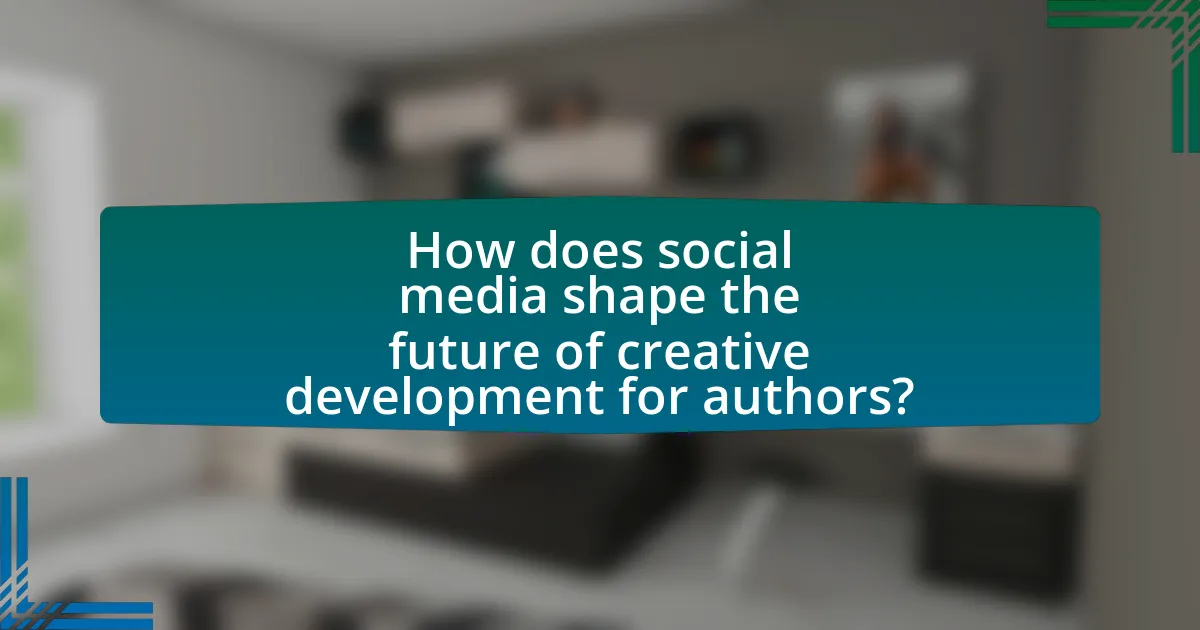
How does social media shape the future of creative development for authors?
Social media significantly shapes the future of creative development for authors by providing platforms for direct engagement with audiences, facilitating real-time feedback, and enabling collaborative opportunities. Authors can utilize social media to build their personal brands, share their work, and connect with readers, which enhances their visibility and marketability. For instance, a study by the Pew Research Center found that 69% of adults in the U.S. use social media, indicating a vast potential audience for authors to reach. Additionally, platforms like Twitter and Instagram allow authors to receive immediate feedback on their ideas and writing, fostering a more iterative and responsive creative process. This interaction can lead to improved storytelling and character development, as authors can gauge audience reactions and preferences. Furthermore, social media encourages collaboration among authors, illustrators, and other creatives, leading to innovative projects that might not have been possible in traditional publishing environments.
What emerging trends in social media could impact authors’ creativity?
Emerging trends in social media that could impact authors’ creativity include the rise of short-form video content, the increasing use of artificial intelligence for content generation, and the growing emphasis on community-driven platforms. Short-form video platforms like TikTok have changed how authors engage with audiences, allowing for creative storytelling in concise formats, which can inspire new narrative techniques. The use of AI tools, such as ChatGPT, enables authors to brainstorm ideas and overcome writer’s block, enhancing their creative process. Additionally, community-driven platforms foster collaboration and feedback, encouraging authors to experiment with their writing styles and themes based on audience interaction. These trends collectively reshape the creative landscape for authors, pushing them to adapt and innovate in their craft.
How might new technologies influence the way authors use social media?
New technologies significantly influence the way authors use social media by providing advanced tools for engagement, content creation, and audience analytics. For instance, platforms like TikTok and Instagram have introduced features such as short-form video content and interactive stories, allowing authors to present their work in more dynamic and visually appealing ways. Additionally, algorithms that analyze user behavior enable authors to tailor their content to specific audience preferences, enhancing reach and engagement. According to a 2021 study by the Pew Research Center, 69% of adults in the U.S. use social media, indicating a vast potential audience for authors who effectively leverage these technologies.
What role will social media play in the evolution of storytelling techniques?
Social media will significantly influence the evolution of storytelling techniques by enabling real-time audience interaction and feedback. This platform allows authors to share their narratives in fragmented formats, such as tweets or Instagram stories, which can lead to innovative storytelling structures that engage audiences in new ways. For instance, platforms like Twitter have popularized the concept of micro-narratives, where stories are told in concise, impactful bursts, reflecting the fast-paced consumption habits of users. Additionally, social media facilitates collaborative storytelling, as seen in projects like #Storytime, where multiple users contribute to a single narrative thread, showcasing the communal aspect of modern storytelling. This shift towards interactive and participatory storytelling is supported by research indicating that audience engagement can enhance narrative retention and emotional connection, thus transforming traditional storytelling methods into more dynamic and inclusive experiences.
What practical tips can authors implement to maximize their creative development through social media?
Authors can maximize their creative development through social media by actively engaging with their audience, sharing their writing process, and participating in relevant online communities. Engaging with readers fosters a sense of connection and provides immediate feedback, which can inspire new ideas and refine existing ones. Sharing the writing process, such as drafts or brainstorming sessions, invites collaboration and encourages creative input from followers. Participating in online communities, like writing groups or forums, allows authors to exchange ideas, gain diverse perspectives, and stay motivated. Research indicates that social media can enhance creativity by providing a platform for collaboration and idea exchange, as highlighted in studies on social networks and creative output.
How can authors create a balanced social media strategy that fosters creativity?
Authors can create a balanced social media strategy that fosters creativity by integrating regular content sharing with intentional breaks from social media engagement. This approach allows authors to showcase their work and connect with their audience while also providing time for reflection and creative thinking. Research indicates that excessive social media use can lead to cognitive overload, which hampers creativity; therefore, authors should schedule specific times for posting and interacting online, while designating periods for focused writing and brainstorming. By maintaining this balance, authors can enhance their creative output and sustain their engagement with their audience effectively.
What tools can authors use to streamline their social media engagement?
Authors can use tools like Hootsuite, Buffer, and Sprout Social to streamline their social media engagement. Hootsuite allows authors to manage multiple social media accounts from one dashboard, schedule posts in advance, and analyze engagement metrics, which enhances efficiency. Buffer offers similar features, enabling authors to plan and publish content across various platforms while providing insights on post performance. Sprout Social focuses on engagement and analytics, allowing authors to interact with their audience effectively and track the success of their social media strategies. These tools collectively help authors save time, maintain consistent communication, and improve their online presence.
